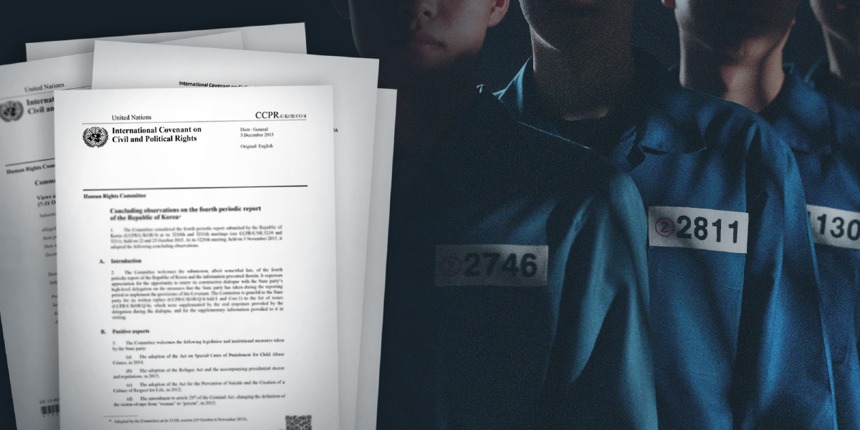After a detailed review of South Korea’s human rights record, the UN Human Rights Committee adopted its concluding observations on November 3, 2015. The Committee acknowledged positive steps that South Korea has taken on behalf of human rights but specifically noted its failure to implement the Committee’s previous decisions on conscientious objection to military service.
Right to Freedom of Conscience and Religion
Although conscientious objection to military service is internationally recognized as a fundamental human right, South Korea continues to punish those who conscientiously refuse to serve in the military. But South Korea systematically violates this human right since 1950.
The report of the UN Human Rights Committee urged the government to:
-
Immediately release all conscientious objectors imprisoned for refusing military service.
-
Clear conscientious objectors of a criminal record, provide them with adequate compensation, and ensure that it does not publicly disclose their personal information.
-
Legally recognize conscientious objection to military service and provide conscientious objectors the opportunity to perform alternative civilian service.
Responsible to Implement Its Treaty Obligations
Since 2006, the UN Human Rights Committee has issued five Views faulting the government of South Korea for its failure to adopt legislation to protect the right to conscientious objection and for punishing those who claim the right. The Committee’s recent report again urged the government to “establish mechanisms and appropriate procedures to give full effect to the Committee’s Views,” including the full implementation of the Views the Committee has already issued.
Following the release of the report, Seong-ho Lee, the chairman of the National Human Rights Commission of Korea, acknowledged the human rights violations identified in the report. In a public statement advising the government to implement the Committee’s recommendations, Mr. Lee concluded: “The government is responsible for fully implementing the ICCPR [International Covenant on Civil and Political Rights].”
As a State party to that treaty, South Korea has obligated itself to protect the rights the ICCPR guarantees. Since the UN Human Rights Committee oversees the implementation of the ICCPR and recognizes the right to conscientious objection, South Korea will continue to be in violation of the treaty until it implements the Committee’s Views and recommendations.
The UN Human Rights Committee’s recent report adds another voice to the growing international outcry over South Korea’s treatment of conscientious objectors. Many in South Korea and elsewhere will keenly watch the government’s response to this call for compliance with its obligations.
Source: UN Human Rights Committee Urges South Korea to Recognize Conscientious Objection
